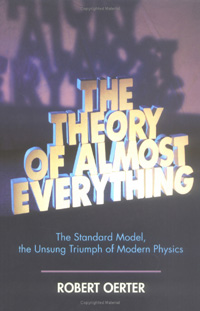 Author: Robert Oerter
Author: Robert Oerter
Started: 4 Dec 2005
Finished: 14 Dec 2005
327p / 11d
30 p/d
When I left the Jefferson Davis book in a hotel and hadn’t yet replaced it, Brandy bought me this so I would have a book on my next plane flight. It was a very kind gesture. Of course, being all the way I am and stuff, I refused to start the book, because I had started the other book, and I had to finish that one before I could start another one, and then of course there would have to be a fiction book in between because I alternate fiction and non-fiction and such. I was of course being a little bit of a nut. But in the end I did indeed get a new copy of the Davis book, read that, then Harry Potter. But I promised Brandy that this book would be next rather than waiting for all the other books in line.
Anyway… When Brandy first handed it to me I figured it would be your standard sort of pop-physics book where you had an overview of 20th century physics, and the bulk of the book would talk about some of the hot new cutting edge theories currently grabbing people’s imaginations. But that wasn’t what this book was about. It turned the normal form of these books upside down. Rather than the review of the old stuff and concentration on the new stuff, this was the reverse. Just a little of the new stuff at the end, but most of the book was a detailed review of the “Standard Model”, which is basically the unified theory of all of physics… except gravity… and except a few things it can’t explain yet which are where the newer theories come from.
This was an interesting take on things. Although of course it meant that almost all of what was there was stuff I had seen before, either in other similar books, or when I was actually studying physics in college. Of course, most of that has faded completely out of memory, so it was a good refresher. It reminded me just how ugly the standard model is though. It may well be the best explaination we have of all sorts of things, but it is ugly. Too many pieces, too many arbitrary factors. (18 I believe it is.) It just isn’t pretty. Which is of course one of the reasons the search for “more fundamental” theories continues.
Also, given that I was a physics major, there is one similar frustration I almost always feel with these sorts of pop-physics books. There is a pattern they seem to all share:
* In the beginning of the book, when they are speaking about the oldest physics, the physics that has been around the longest and is closest to what someone who hasn’t read about this kind of stuff before it does pretty good. Explains everything in lay terms and I feel OK with that, and it works for me.
* In the middle of the book, as they get into more advanced stuff, I start getting frustrated by the lack of math. I know, I know, it is a book for the general public, not for ex-physics majors, but I start getting really frustrated by the lack of the details. In many places where the author is jumping through hoops trying to explain things without being matehmatical or technical I start screaming out for the math, wanting to see THAT because to fully get it you need both the “engligh” stuff as analogy, but then you need the math to see and understand what is really happening. The english gets the general point across, but I always find myself wanting more…
* Then in the ends of these kinds of books, they move from going over things in all sorts of detail (although in English, not in Math) to suddenly soaring higher and higher and higher. Concepts which could be entire books go by in mere pages. Once again the lack of math hurts. But it is also just that there is a suden shift into higher and higher gears. Lots of times on the basics, then less and less time on the more advanced concepts. Shouldn’t it be the reverse?
But again, I think all three points are necessary common elements of pop-physics books for non-experts. You wrtie differently if you are giving a general overview for the non physics public than you do if you are writing a textbook… and lets say it was a textbook. They have that whole issue of needing to already know the prerequisites. One can’t just pick up a textbook on modern particle physics theories without having made sure you are completely familiar with quite a lot of subjects… that would take a few years of physics undergrad (at least) to get fully up to speed with.
So, I understand why it is the way it is. But being an ex-physics guy it still frustrates. I miss the physics, I miss the math. This kind of thing gives me a taste of what I’ve been missing and makes me want more. Of course, I know if I *did* go out and get an advanced level textbook I’d be lost right away. I had four years of physics undergrad, but at this point it was many years ago. I’d practically have to start at the beginnning to refresh my memory. I’m sure it would come back quickly, but I certainly couldn’t start with Lagrangians and Hamiltonians and General Relativity… I’d have a LOT of review to do!
Oh well! For now it will have the be the occational pop-physics book. :-) And this one did just fine.

Leave a Reply
You must be logged in to post a comment.